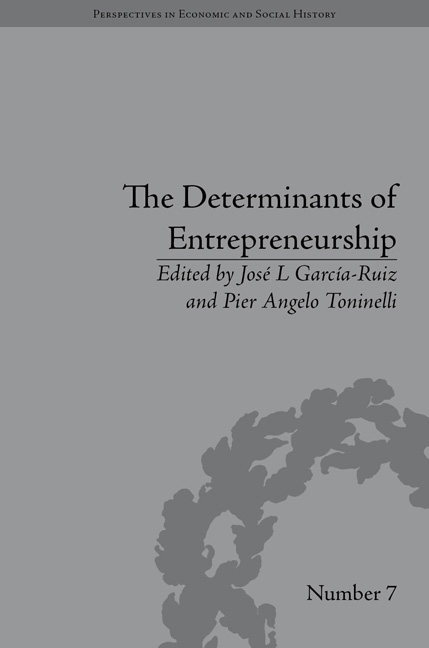Book contents
- Frontmatter
- CONTENTS
- List of Figures and Tables
- List of Contributors
- Introduction
- Part I Entrepreneurial Typologies
- Part II The Business Leaders
- Part III Culture or Institutions?
- 6 Entrepreneurial Culture or Institutions? A Twentieth-Century Resolution
- 7 Entrepreneurship and Cultural Values in Latin America, 1850–2000: From Modernization, National Values and Dependency Theory towards a Business History Perspective
- 8 Education and Entrepreneurship in Twentieth-Century Spain: An Overview
- Notes
- Works Cited
- Index
8 - Education and Entrepreneurship in Twentieth-Century Spain: An Overview
from Part III - Culture or Institutions?
- Frontmatter
- CONTENTS
- List of Figures and Tables
- List of Contributors
- Introduction
- Part I Entrepreneurial Typologies
- Part II The Business Leaders
- Part III Culture or Institutions?
- 6 Entrepreneurial Culture or Institutions? A Twentieth-Century Resolution
- 7 Entrepreneurship and Cultural Values in Latin America, 1850–2000: From Modernization, National Values and Dependency Theory towards a Business History Perspective
- 8 Education and Entrepreneurship in Twentieth-Century Spain: An Overview
- Notes
- Works Cited
- Index
Summary
Introduction
Since Joseph A. Schumpeter published his Theorie der wirtschaftlichen Entwicklung in 1911, 1 an important role has been assigned to ‘entrepreneurship’ in economic growth, but until recently in too imprecise a way. In recent years, thanks to three large initiatives – the Observatory of European Small and Medium Enterprises (SMEs), belonging to the European Union; the Centre for Entrepreneurship, SMEs and Local Development, belonging to the Organisation for Economic Co-Operation and Development (OECD); and the Global Entrepreneurship Monitor (GEM) – and the work of some scholars it has been possible to make progress in dealing scientifically with entrepreneurship, that is, elaborating theories that can be empirically tested. These researches have been of interest to governments, particularly those from European countries in which entrepreneurship has been in difficulties for many years. Thus, in 2003, the European Commission brought out the well-known Green Paper on Entrepreneurship in Europe, which is based mainly on research done by David B. Audretsch, who proposed a debate on several initiatives to stimulate entrepreneurship in Europe.
Reflecting this concern, the Spanish Consejo Económico y Social (CES) published in 2005 a report entitled El proceso de creación de empresas y el dinamismo empresarial, which to a great extent was based on GEM reports. These reports have always paid attention to factors involved in creating businesses where public policies can take action (Table 8.1).
- Type
- Chapter
- Information
- The Determinants of EntrepreneurshipLeadership, Culture, Institutions, pp. 161 - 182Publisher: Pickering & ChattoFirst published in: 2014

